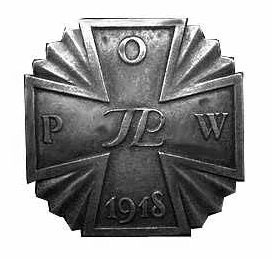
Orbiks Published in Various History Books and Monuments
Laurentis Orbyk - Polish Infantryman in 1471
The very first reference to an Orbik occurs in a book, Historya piechoty polskiej [The history of Polish Infantry], by Konstanty Górski, published by Nakł. Księg. Spółki Wydawniczej Polskeij, 1893. In ROZDZIAŁ I. Piechota polska pierwszych trzech ćwierciach [ Polish Infantry in the first third quarter] page 7 discusses the first records of Polish use of infantry in 1471. The Pieszej Rotmistrza "walking master of the horse" Marka on paper had 500 people, 73 with paezy , 259 with kuszami [crossbows], 12 with proparcami [banners/streamers] and 5 with with hakownicami [grapple hooks], and all 449 people. Later in the notes it lists all of the names and on page 216, it list Laurentius Orbyk, strzał podzelowany, miecz [foot soldier with sword]. Note that there is no direct connection between the name Orbyk and the Orbik families from Tayno and and Augustow, but it is possible and warrants more research.
Jozef Orbik in Tajno 1850s.
On 18 May, 1850, Jozef Orbik, gospodarz, 40 years old, in the presence of Jozef Golpych (Gołpych), Captain in the Tsar's Army, in the Regiment of Prince Kutuzow, 37 years old, constituting in Tajno, and Andrzej Mieczkowski, gospodarz, 43, announced the birth of a son named Jozef to his wife Jozefa Kulik. Jozef Golpych and Katarzyna Pietraszewicz were the godparents. According to the history of this regiment:
"In 1849 the regiment at first remained in its previous locations but in April it left for the town of Kalisz, near to which it went into billets until July. From July onwards companies were deployed to various localities for guard duties. In the month of November the regiment moved to new quarters with the regimental staff going to Augustow and battalion headquarters to Suwalki, Raigorod, Rachki, and Filippovo. In 1850, after concentrating in camp near Suwalki, the regiment in August spread out with the regimental headquarters and the headquarters of the 4th Battalion moving to Suwalki and the other battalion headquarters going to Kalvaria, Vyshtinna, and Filippovo. In autumn of that same year the 1st and 2nd Battalions received new colors with Alexander Ribbons and the inscription "1700-1850", signifying the 150 years of the regiment’s existence. In May of the same year Colonel Yakov Ivanovich Trubnikov took over the regiment."
http://marksrussianmilitaryhistory.info/PSKOV.html If this link breaks,
read the whole story downloaded on PDF.
Franciszek Orbik in the Russian Army
Franciszek Orbik (born 1848), was the eldest son of Jakob Orbik (1827-1908) and Franciszka Wawiorka,(1829-1896) and older brother of my g-g-grandfather Jan Orbik (1852-1908). On his marriage certificate from Barglow-Koscielny parish on 19 Nov 1878 to Anna Wolksa, Franciszek was listed as a soldier on leave, 30 years old, born in Tajno and living in Tajenko. The first record of his children's births was in Oct 1890 in Kamionka Stara, so it was probable that Franciszek Orbik served a 20 year term in the Russian army.
Wladislaw Orbik WWI
There is a monument in Barglow-Koscielny to a group of people executed by the Germans in WWI. One of the names is Wladislaw Orbik. Andrzej Orbik, my distant cousin in Poland, thinks this person was his father's uncle. Another version of the origin of this monument is that was erected to honor those who fought in the Polish Underground to WWI. The only Wladislaw Orbik that was alive at this time was born in 1899 and was the son of Kazimierz Orbik and Alexandra Orlowska which would confirm him as Ryszard Orbik's uncle.

"After three months of interrogations, due to lack of sufficient evidence, twenty three members of the POW [Polish Military Organization] were released from jail, and three – Witold Niesiobedzki, Franciszek Chroscielewski, and Waclaw Zlotkowski were placed in the Modlin fortress camp. In August 1918 a give-away occurred, much more tragic. A military patrol in the village of Tajno at night caught Wladyslaw Orbik, Jan Nagolski, and Puchalski with guns in their hands. The last one, wanting to save himself, started to talk. As a result, new arrests were made and a process in the outcome of which three members of the POW, Jan Strzalko, Jan Nagolski, and Wladyslaw Orbik, were sentenced to death and shot in Grajewo. Jan Strzalka’s and Wladyslaw Orbik’s behavior to the last minute was exceptionally dignified and brave. Shackled by hands and feet, tortured, they not only didn’t give anyone away, but took the blame themselves. During the interrogation before the proceedings a German police commissar, Cyranek, who specialized in exposing the POW, inhumanly tortured prisoners. After these cases the entire conspiratorial work in the 7th District became subdued and more attention was paid to more diligent conspiracy. At this time the scouts were also brought in.”
Aby Pamięć Nie Zginęła: Towarz Miłośniów Rajgrodu. Rajgrod, 1997. pp 57-58.
-w.jpg)
-w.jpg)
-w.jpg)
-w.jpg)
I am 2nd cousins 3 times removed from Wladislaw Orbik.
According to the book, First Names of the Polish Commonwealth: Origins and Meanings by Hoffman and Hellon (1998), Wladislaw is an old Slavic compound name meaning " rule" and "glory".
Przemyslaw Orbik, born in Debe, son of Franciszek Orbik and Julianna Golas.
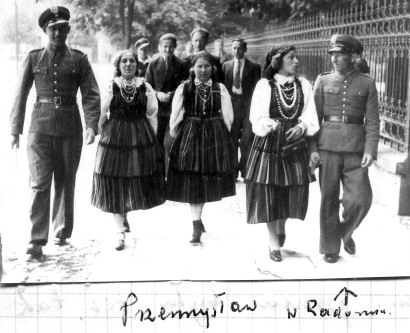
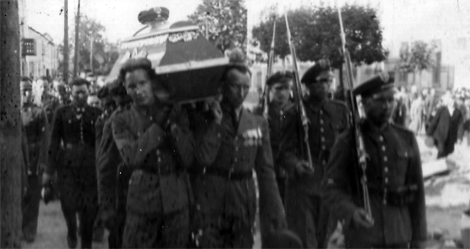
I found a book in Polish called Pamienci Lotnikow Polskich 1918-1945 (Jerzy Pawlak, Warszawa,1998) which roughly translated means Memories of Polish Airmen 1918-1945. It list the names of Polish Airmen killed in the service of their county. It lists Przemyslaw Orbik as a corporal -mechanic, born Jan 14, 1914 and died on 16 June, 1939, two and a half months before the start of WWII.
Family stories relate that Przemyslaw Orbik was a mechanic in the Polish Air force. During a test flight after a repair, the plane crashed killing all on board. Story from Andrzej Orbik from Gorzow Wielkopolski.
According to the book, First Names of the Polish Commonwealth: Origins and Meanings, Przemyslaw is an old Slavic compound name meaning " through, thought, and glory".
Stefan Orbik, Warszawa Uprising 1944.
I found another Polish book called Ksiega Poleglych Na Polu Chwaly: Zolnierze Ludowego Wojska Polskiego Polegli, Zmalri Z Ran I Zaginieni W Czasie Drugiej Wojny Swiatowej W Latcah 1943-1945 (Book of Those Killed on the Field of Glory: Polish People's Army Killed, Died of Wound, and Missing in Action in the Time of World War Two in the Years 1943-1945.) It was published by the Minsterstwa Obrony Narodowej (Ministry of National Defense), Warszawa, 1974. On page 911, it lists:
Stefan Orbik, son of Michal, born 1924 in Augustów of the woj. (state) of Bialystok. He was a starszy sierzant (master sergeant) and was listed as missing on August 2, 1944 in Warsaw.
The new Museum of the Polish Warsaw Uprising has a wall with a list of names of those defenders killed or missing in action during the fight.
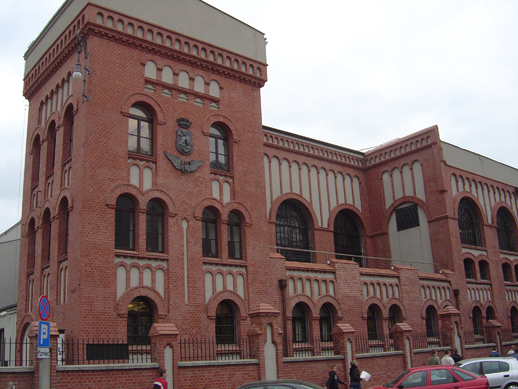 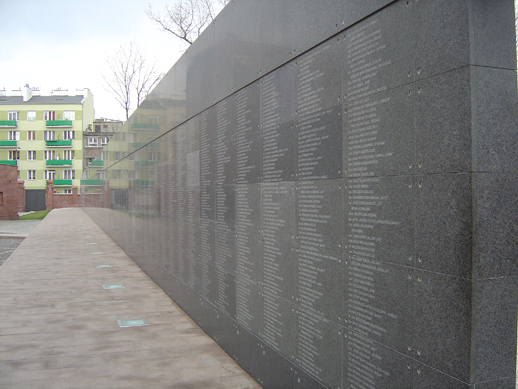 |
|
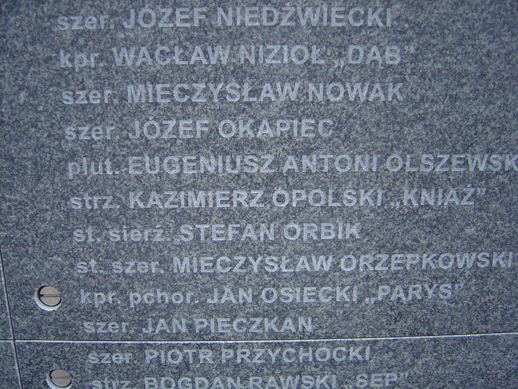
Bronislaw Orbik
WWI and 1920 Polish-Soviet War
Born in 16 April 1900 to Franciszek Orbik and Anna Stolarczyk. Served in POW during WWI. Served in 33rd Infantry regiment in 1920 Polish-Soviet War. Died 30 Dec 1984 in Tajno Stare
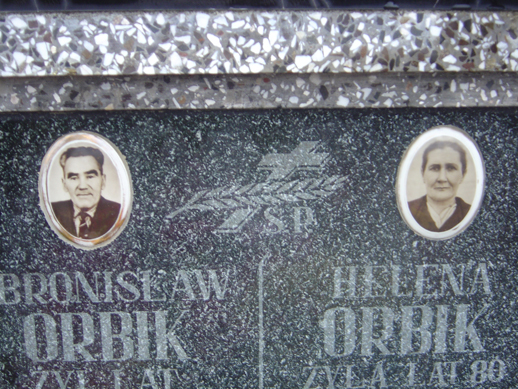
A Detailed Life Story and the Specification of Ideological Work for the Independence of Poland.
Bronislaw Orbik - born in 1900 in the village of Tajno; during the occupationworked as a teacher; joined the Polish Military Organization; one of the mostactive members of the Organization and the Security Section; the executioner of the death penalty on German spies; caught by the Germans and kept prisoner for 8 months; took an active part in disarming the Germans; after that joined the Polish Army as a volunteer and fought duringthe war campaign; as a sergeant granted leave for an indefinite term; at present participates in the social, political and educational work.
A Detailed Life Story and the Specification of Ideological Work for the Independence of Poland.
"I was born on April 12, 1900 in the village of Tajno Stare, Commune of Pruska, Szczuczyn County. Until the age of 12 I was brought up by my parents and attended the state elementary school. Then I was sent to the municipal school in Augustow but because of the war I could not finish it. When the Germans attacked, I returned home. I completed the courses during the German occupation and worked as a teacher in the village of Kroszowka, Commune of Pruska for 2 years. At that time, that is in 1917, I found out about the existence of the Polish Military Organization. Being very young, yet full of enthusiasm for Poland and hatred for the enemy, I decided immediately to join the foregoing Organization. In March 1917 I swore an oath before Franciszek Chroscielewski, the local Commander of the Polish Military Organization in Rajgrod. I worked as the Assistant Section Commander. At first, my work for the Organization was limited to the recruitment of as many candidates as possible to join the organization - the members who would be reliable and who could understand the idea of the Organization. Indoctrinating the young -people, noticing their eagerness to sacrifice themselves for the benefit of Poland I always mentioned the Organization and encouraged them to take an oath. This was how in the village of Tajno Section Commander Janiszewski and I organized a unit consisting of about 20 people. In the first weeks we stressed the importance of military training to instruct and drill a well-disciplined member able to take up the face-to-face fight with the Germans, if necessary. I was also hiding the weapons and ammunition at my place. At that time the Germans from the local headquarters in Rajgrod tracked down the Organization and they began arresting the members of the Organization. After local Commander Chroscielewski and Janiszewski were arrested, I was put in charge of the unit in Tajno and continued to train the people. The Germans had their own organization of spies, at the same time as our Organization, operating in the locality of Tajno who knowing about us began to trail us. Then we started to execute the death penalty and kill the spies. First we killed the secret agent and then one of his subordinates. Although espionage ceased soon, after so many murders, especially the last one, when one of the spies was killed, the Germans arrested three armed members of our unit. Further arrests continued. I was also arrested and put in jail in Grajewo. The Germans displayed cruelty to me, treating me with extreme brutality, beating me a few times a day and starving me. The fact that I am still alive today I owe to the police commissioner who liked taking bribes. The Court-Martial sentenced me to six years in jail. I was sent to jail in Lomza where I was held until the Germans were disarmed. I carried illegal publications, leaflets and weapons to the region of Suwalki and hid the members of the Polish Military Organization. When I was released from jail, I joined the 33rd Polish Regiment as a volunteer. In the rank of sergeant I was on the front-line with the Regiment all the time. Nowadays I have my own farm in the village of Tajno, Commune of Pruska.
| Signature: /Bronislaw Orbik/ A small oval seal of the Central Military Archives. Overleaf: The stamp of Central Military Archives Orbik Bronislaw KN June 27th, 1938
|
 |
|
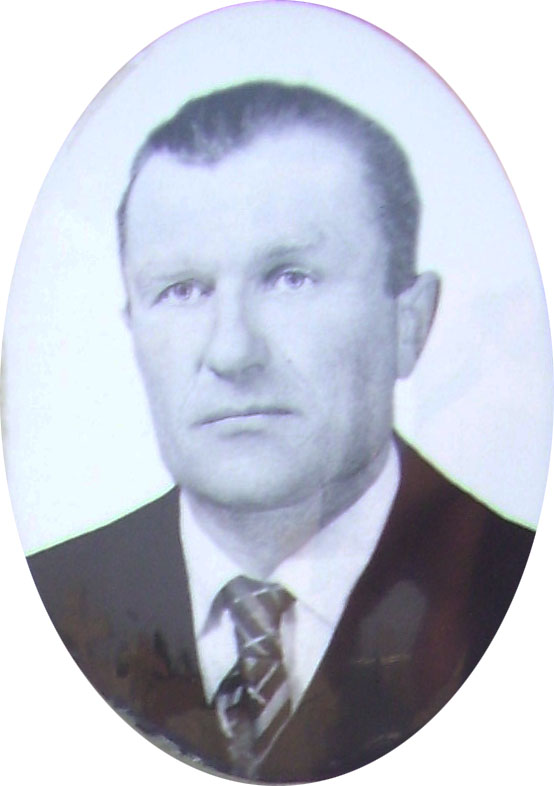
Information provided by Celina Ulowicz, granddaughter of Bronislaw Orbik.
Mieczysław Orbik died in Warsaw Defense in 1939
While the memoir's of Stefan Orbik states that his brother Mieczysław Orbik, who died in Warsaw in September 1945 of a medical condition did not serve in the military, there is a Mieczysław Orbik buried in a military section of a cemetery on Wałbrzryski Street in the Mokotow section of Warsaw. I cannot find any other Mieczyslaw Orbik that this could be.
Source: Księga pochowanych żołnierzy polskich poległych w II wojnie światowej (Book of buried Polish soldiers killed in World War II)
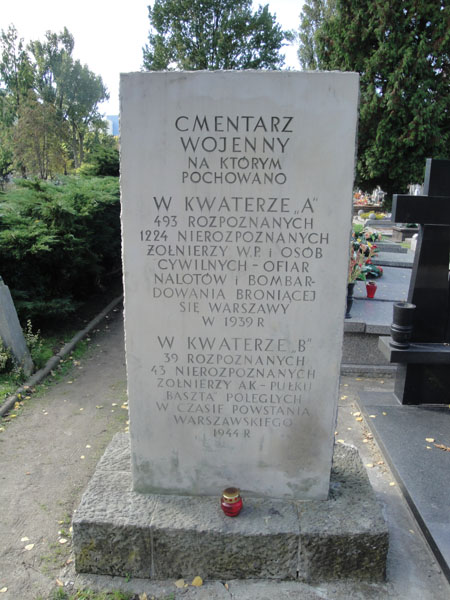
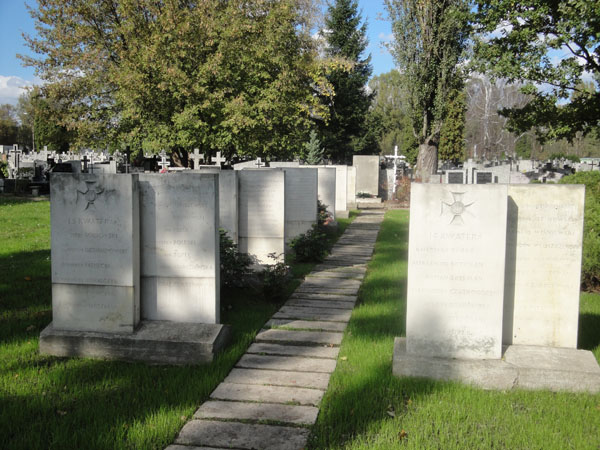
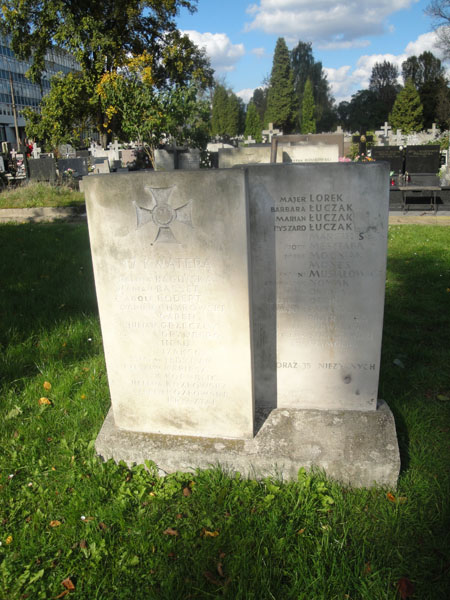
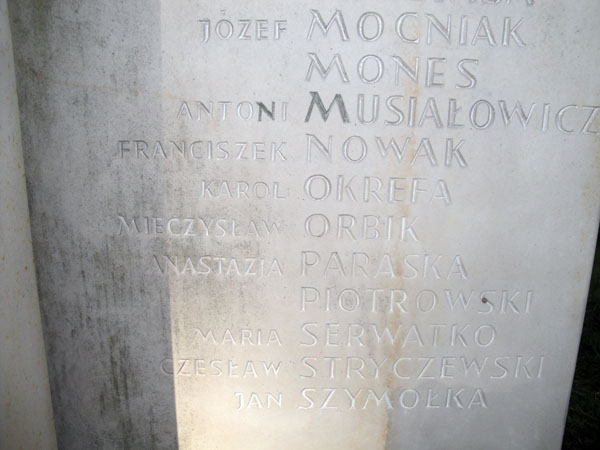

The Orbiks deported to Siberia.
Stanislaw Orbik, Czeslaw Orbik, sons of Jozef Orbik and Jozefa Lesczynska, died 9 May 1946 in Siberia, announced 7 Nov 1958 in Augustow registry office.
Their father Jozef Orbik, son of Jan Orbik and Franciszka Biekeska, also died 9 May 1946 in Siberia, announced 7 Nov 1958 in Augustow registry office.
This is a new monument in the village of Netta to the victims of the those who lost there lives in exile in Siberia in WWII.
Photo of Jay Orbik with Edward Orbik and his wife in Augustow in 2007. Edward is the youngest son of Jozef Orbik and Jozefa Lesczynska. He was spared from being sent to Siberia and grew up with his sister.
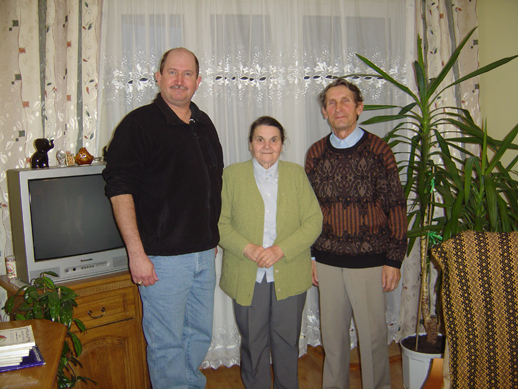
Bolesław Orbik 1895 -1945
Bolesław Orbik was acting as village headman (soltys) of Tajno during WWII. He was forced to make some difficult decisions under pressure from the occupiers of both the Germans and Soviets and consequently made some serous enemies from all sides of the conflict. In 1945, he was "executed" by the Polish underground. See more about his story.
Stefania Orbik, wife of Stephan Orbik from Dudy, was a forced laborer for the Germans in a hospital in Krakow from March 1942 to January 1945. Source: Foundation for Polish-German Reconciliation.
Marianna Orbik, wife of Mieczysław Orbik from Dudy, who died in Warsaw in September of 1939, was imprisoned in Ravensbruck concentration camp in Germany from April 1940 until August 1940. Source: Foundation for Polish-German Reconciliation.
Zygmunt Orbik, born in Dudy, was arrested and imprisoned in Stadtgut Drobel w Bernburg, from 16.10.1939 to 27.January, 1942. (source: Polish Red Cross,). According to the family story written by Stefan Orbik, Stanislaw Orbik (below) voluntarily took his brother Stanislaw's place, because Zygmunt was married.
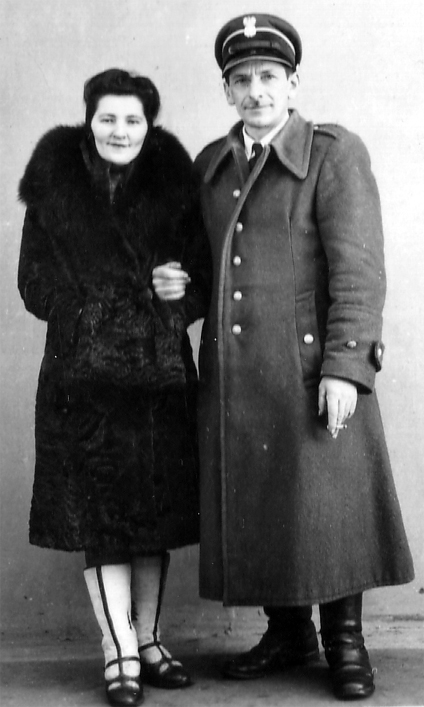
Stanislaw Orbik, born in Dudy, son of Franciszek Orbik and Julianna Golas.
According to the Polish Red Cross, Stanisław Orbik was a forced laborer on a farm owned by a Knapp in Bernburg, Dessauerstr 61, from 25 January 1942 to 22 June 1945. He took his older married brother Zygmunt Orbik's place.
He and his family ended up in France during WWII. Stanislaw was a sergeant in the French Foreign Legion and died in Algeria during the uprisings with some of his family in the 1950s. Story and photo from Andrzej Orbik from Gorżów Wielkopolski. Also confirmed by Francois Orbik, now living in France.
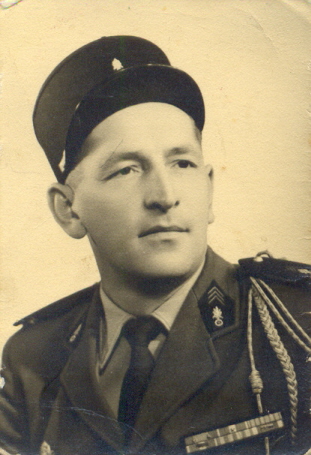
Stanislaw Orbik (1923-1954)
Bolesław Orbik WWII partisan, born in 1902 born in Debe, son of Franciszek Orbik and Julianna Golas. Died while in the concentration camp- KL Stutthof, during WWII. Story from Andrzej Orbik from Gorzow Wielkopolski
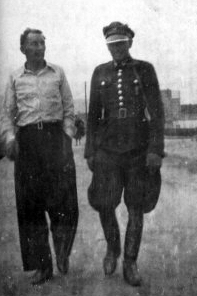
Bolesalw orbik (left) with his brother Mieczyslaw Orbik in Gdynia in 1937.
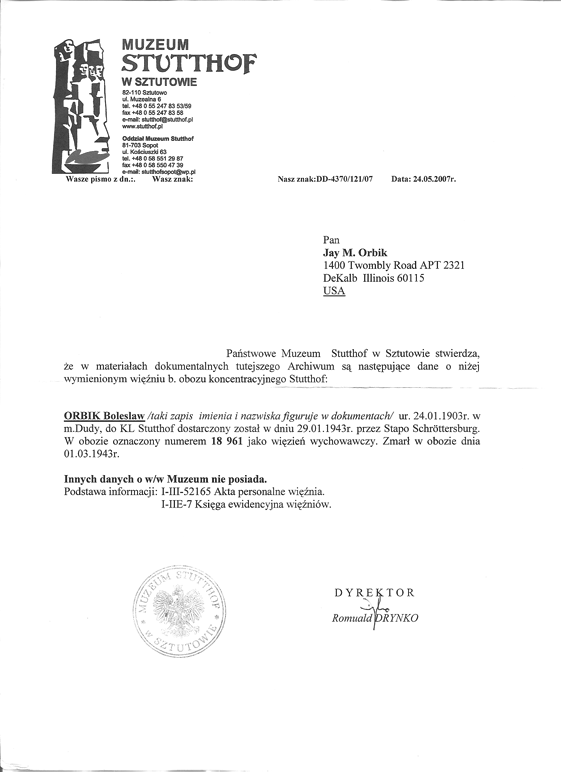
Helena Orbik. In a book called Zapomniane Dziewczęta [Oblivion of Women] , by Bronislawa Sanejko-Kwasnicka, Oddial Lubelski Stowarzyszenia, Lublin 1995,
Stan ewidencyjny 316 Kompanii Transportowej
Pomocniczej Wojskowej Służby Kobiet
Po wyjeździe z Egyptu i wylądowaniu we Włoszech 4 maja 1944.
(pierwsze miejscepostoju - San Dominico)
There was a Helena Orbik listed on page 242 # 82 as a starze ochotniczka [senior private].
On page 248, starze ochotniczka. Helena Orbik is listed again as a recipient of the "Medalem Wojska" War Medal
W rokazie dziennym Kompanii Nr 105 z dnia 7 V. br., nad powstawie Rozkazu Pers. Dztwa Korpusu Nr 165 dnia 16 IV 1946, niżej wzmienione odznaczone zostały "Medalem Wojska".
As of Septemmber 2006, I do not know who this Helen Orbik is or what happened to her.
In 2010, I found a marriage record on ancestry.com of a Helena Orbik to Alfred Haberla between Oct-Nov 1946 in Northumberland North 1st, Northumberland County. Volume 1 b. page 634.
Frank J. Orbik WWII.
Frank J. Orbik, son of Stanislaw Walter Orbik from Anderson Indiana served in Company "D" of the 745th Tank Regiment. He was listed as a "tech 5" in the Roster of Officer and Enlisted Men since 6 June 1944.
Source: http://745tank.com/pages/p28.html
745th Tank Battalion
Activated on 15 Aug August42 1942 at Camp Bowie, Texas, under command of Major Maj. Thomas B. Burns. Formed part of the assault echelon at Omaha Beach on D-day, landing its first co company on 6 Jun June44 1944 in support of 1st ID. Infantry Division. Fought in St. Lo Breakout breakout and envelopment of Falaise Pocket. Raced east in wake of 3d Armored Division. Supported 1st ID Infantry Division near and in Aachen in Sep September44 1944 and attack toward Ruhr River beginning 16 Nov 1944. Ordered south with 1st ID Infantry Division on 16 Dec 1944 to help stop Ardennes offensive, continued to support the division against the Bulge and Siegfried Line through Feb 1945. Participated in assault across Ruhr River on 25 Feb 1945. Reached Rhine River at Bonn on 11 Mar 1945. Crossed the Rhine at the Remagen bridgehead. Took part in Ruhr Pocket envelopment in Apr April45. Crossed the Weser River and advanced into the Harz Mountains and then to the Czechoslovakian border, where further movement eastward was halted on 7 May 45 1945.
Source: http://homepage.mac.com/yeide/Tank%20Battalion%20Histories.htm
Stephan P. Orbik
The 1920 US Census had Stephen P. Orbik, 19, soldier, born in Michigan, as an inmate in the US Naval Yard in Puget Sound in Kitsap County, WA. This may have been a hospital in the U.S. Marine corps detachment at Puget Sound. He shows up in Marine Corps muster rolls enlisting in 13 Nov 1918 and discharged Jan. 26 1920 "For the convenience f the government. Character-EXCELLENT". He was the son of Franciszek Orbik and Veronica Ropelewski, born in Michigan in 1900.
Stanley A. Orbik
Stanley A. Orbik 21 May 1928-24 Feb 2000, son of Konstanty Orbik, served as a PFC in the US Army in Korea and is buried in Holy Trinity Cemetery, Bear Creek, PA.
Raymond Frank Orbik
Raymond Frank Orbik (23 May 1927- 3 Apr 1994) entered the army in 1947 and served in Korea, and Vietnam. He is buried in Camp Nelson National Cemetery RR #3 6980 Danville Road Nicholasville, KY 40356. Section H Site 695.